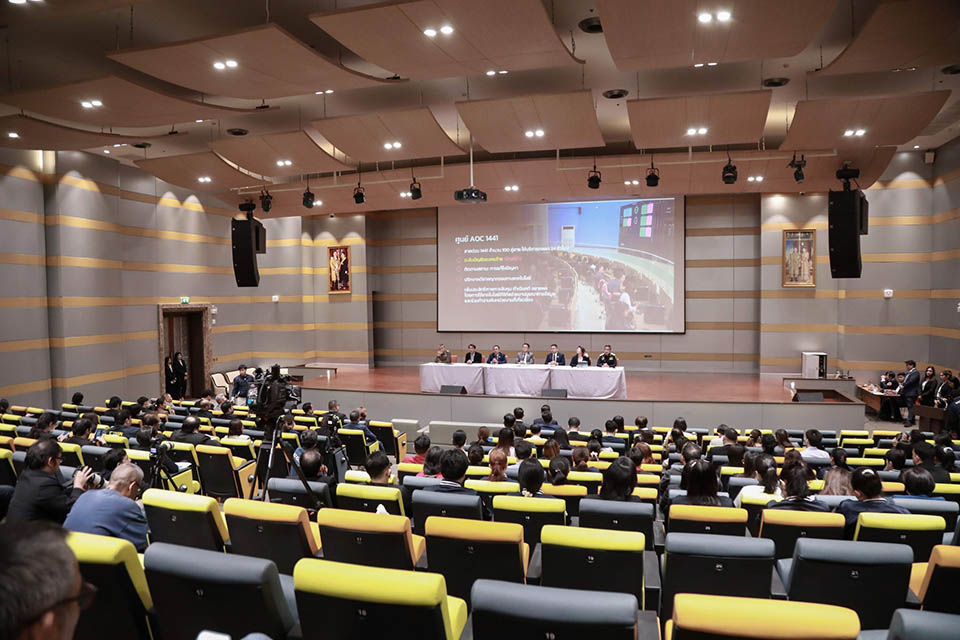
BANGKOK, Thailand – The Ministry of Digital Economy and Society (DE) announced on November 14 a substantial impact on online crime prevention through its Anti-Online Scam Operation Center (AOC 1441), established a year ago to combat digital fraud in Thailand. The center, which coordinates efforts with numerous government agencies, has successfully frozen over 340,000 accounts linked to suspected online scams, preventing financial losses totaling 19 billion baht.
AOC Hotline 1441 – Rapid Response and One-Stop Assistance
- One-Stop Service: The AOC hotline 1441 operates 24/7, equipped with 100 lines providing one-stop assistance to victims. As soon as a call is received, the hotline can initiate an immediate account freeze for suspicious accounts (also known as “mule accounts”) used in fraud. With an average response time of just 10 minutes, this swift intervention helps protect victims from further financial harm without requiring them to go through prolonged processes with their banks. The information is then forwarded to law enforcement for further action, allowing victims to avoid additional bureaucratic steps.
- Integrated Data Sharing Across Agencies: AOC 1441 has become a crucial data-sharing hub, linking insights and reports with relevant organizations like the Bank of Thailand, Royal Thai Police, and the Anti-Money Laundering Office (AMLO). This integrated approach helps officials to identify patterns and track down “tiered mule accounts”—secondary and tertiary accounts used to obscure transactions. In addition, it aids in uncovering account sellers and larger networks behind the scams. Data sharing across agencies has enabled targeted enforcement actions against these networks, curtailing the activities of organized cybercriminals.
- Cross-Agency Policy and Technological Interventions: The center actively coordinates with agencies, including the National Broadcasting and Telecommunications Commission (NBTC) and the AMLO, to address structural issues that facilitate online crime. The NBTC, for example, has introduced measures to tackle unauthorized “ghost SIMs” and illegal telecommunication signals along border regions that aid scam operations. The Bank of Thailand has also implemented enhanced account monitoring measures, targeting mule account usage and financial fraud patterns to prevent account misuse at an institutional level.

Statistical Insights on the AOC’s Impact
Since its launch on November 1, 2023, through October 31, 2024, the AOC hotline 1441 received over 1.17 million calls, leading to action in 348,006 cases of account freezing or intervention. This response underscores the vast scale and urgency of Thailand’s online fraud epidemic. The majority of cases involve victims aged 20-49, with scams centered around income-generating schemes, investment fraud, and online shopping scams.
High-Risk Age Groups:
– Under 20 Years: Recorded 9,800 cases with total damages of 193 million baht, primarily from scams involving online shopping and call-center frauds targeting young consumers. Female victims constituted 61.44% of this group.
– 20-49 Years: This group represented the highest number of cases (145,302), with damages amounting to 8.22 billion baht. Common scams involved promises of extra income and online investment schemes, with female victims constituting approximately 64.05%.
– 50-64 Years and 65+ Years: Collectively accounted for 41,901 cases, totaling 7.77 billion baht in losses, with a prevalence of fraudulent investment schemes targeting older adults who are often more vulnerable to investment pitches.

Most Common Scam Channels:
Social Media: Facebook led the list with 26,804 cases and a financial impact of 718 million baht.
Call Centers: Represented 22,299 cases with damages totaling 945 million baht.
Other Platforms: Scams on websites, TikTok, and miscellaneous channels cumulatively led to thousands of cases, with total damages exceeding 1 billion baht.
Geographic Distribution of Reports and Interventions
The provinces reporting the highest rates of online crime include:
– Bangkok: 84,241 reports and 48,558 account freezes.
– Samut Prakan: 17,853 reports and 10,968 account freezes.
– Nonthaburi, Chonburi, and Pathum Thani also reported high numbers of cases, reflecting urban centers where scams target residents with higher disposable incomes.
Decreasing Trend in Online Crime Reports
Notably, from October 2023 to September 2024, the Ministry reported a significant decline in online crime cases, especially in August and September 2024, when cases dropped to 32,266 and 29,579 per month, respectively, from a peak average of 35,000 cases per month during May to July 2024. This decline indicates the growing effectiveness of AOC 1441’s interventions and increased public awareness, as people become more cautious and informed about online scams.
The comprehensive efforts of the AOC 1441, combining real-time assistance, data-sharing across agencies, and preventive policy measures, demonstrate Thailand’s strong stance against online fraud. This coordinated approach has not only prevented substantial financial losses but also laid the groundwork for long-term solutions to combat the growing complexity of online crime. (TNA)








